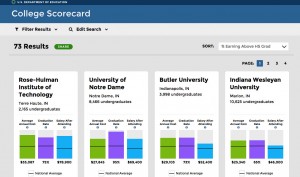Duncan: Indiana College Access Is Great, But ‘I Want Completion’
The U.S. Department of Education recently released a new “college scorecard” – and it’s not your typical ranking system.
The tool gives users access to federal data on college attendance, student debt, graduation rates and other data for more than 7,000 institutions across the country, allowing them to compare schools for themselves. The system does not translate the numbers into ratings on its own.

A screenshot of the U.S. Department of Education’s new College Scorecard, highlighting statistics for schools in Indiana. (Photo Credit: U.S. Department of Education)
But anecdotally, U.S. Secretary of Education Arne Duncan says Indiana is ahead of the game in many areas.
Duncan and some of his U.S. Department of Education colleagues appeared in the Hoosier state as part of their sixth annual back-to-school bus tour. The group parked first at Purdue University Wednesday afternoon; a second Indiana stop is also planned in Indianapolis Wednesday evening, at Crispus Attucks High School.
Look for Eric Weddle’s coverage of Duncan’s Indianapolis stop later tonight.
Duncan says when it comes to higher education, he’s all about three things:
“We have to focus on access, we have to focus on affordability, and we have to focus on outcomes,” he says.
The secretary says Indiana is taking steps to address all of those areas. He commended Purdue president Mitch Daniels for his efforts to keep costs low for students and their families. Purdue is in its third straight year of a tuition freeze. Other state universities, including Indiana University and Ivy Tech Community College, have since followed suit.
Helping students obtain – and pay for – a college degree is a top priority for President Barack Obama’s administration this year. Obama visited Indiana earlier this year to tout his plan to make two years of community college free, incentivizing more people to get trained for high paying, middle class jobs. Earlier this week, the administration also introduced a new version of the FAFSA form for federal student aid, which they say is shorter and easier for students to fill out.

U.S. Secretary of Education Arne Duncan (right) speaks with Purdue president Mitch Daniels on the school’s West Lafayette campus Wednesday. (Photo Credit: Rachel Morello/StateImpact Indiana)
Locally, some state lawmakers and education officials have expressed concern about the Indiana’s remediation and college completion rates. The legislature even included in this year’s budget bill a Commission for Higher Education review of the community college system.
Duncan acknowledges that there are still steps the Hoosier state can take to improve its options for students.
“For me it’s all about outcomes,” Duncan says. “Access is important, but I don’t want just access, I want completion. I want graduation rates. So we need to move some of our funding toward not just inputs, but to outcomes.”
Purdue president and former Indiana governor Mitch Daniels says he agrees, and it’s his goal that Purdue be a leader in this kind of accountability for the state.
“The system of education has tried to avoid accountability…and at both the K-12 and higher ed levels right now, people are appropriately saying, ‘no, show us the results!” Daniels explains. “[It’s] accountability for outcomes, not simply pouring more effort and dollars into inputs without knowing something valuable for young people is happening.”
Purdue is working to increase its graduation rate by introducing a new degree program this fall based on competency instead of credit hours.
There’s been a big push recently for completion across Indiana. The legislature passed a law in 2014 requiring college students who receive financial aid through the state’s two major scholarship programs – the 21st Century Scholar program and Frank O’Bannon scholarship – to complete 15 credit hours a semester, so they can graduate in four years. Data released by Indiana’s Commission for Higher Education in January shows more of these students are doing so.
In the last several months, Duncan’s department has also recognized Indiana’s K-12 education system. The USDOE awarded Indiana a three-year extension on its No Child Left Behind waiver, as well as increases of federal money for school improvement and Advanced Placement tests for low-income students.
But Duncan himself has also expressed concern about some of Indiana’s initiatives, specifically the On My Way Pre-K pilot program because of its limited access for undocumented preschoolers. Chalkbeat Indiana reported in August that the program blocks children of immigrant families from enrolling if they are not U.S. citizens.
Ahead of his trip, Duncan told WFYI’s Eric Weddle that he hopes to discuss the issue with state officials while he’s here:
“It just doesn’t make any sense to me … The children are not here for any fault of their own and people can pass judgement or not pass judgement on their parents or whatever. But to say to children — who are going to come to a public school at kindergarten — to say, you don’t have the right or opportunity to great preschool education just means they are going to start school further behind. It means it will be harder on their teachers. Harder on their classmates. It is not fair to them. It is not fair to their families. I don’t understand that mentality. I don’t think that is who we are as Americans.”
The USDOE billed Duncan’s eleven-stop, seven-state bus expedition with the theme “Ready for Success,” aiming to highlight preschool and college readiness initiatives. His final leg includes stops in Kentucky, Ohio and Pennsylvania.
